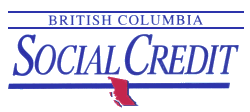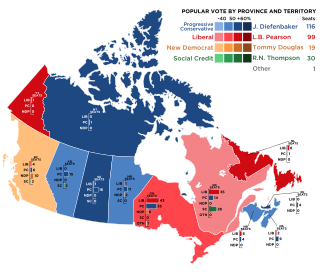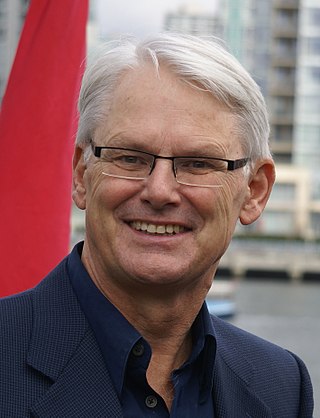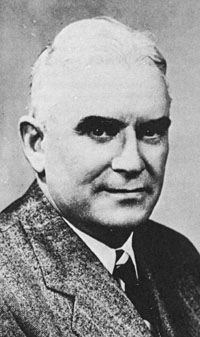BC United (BCU), formerly known as the British Columbia Liberal Party or BC Liberals, is a provincial political party in British Columbia, Canada. The party has been described as conservative, neoliberal, and being on the centre-right of the left–right political spectrum. The party commonly describes itself as a "free enterprise coalition" and draws support from members of both the federal Liberal and Conservative parties. Since the 1990s, BC United has been the main centre-right opposition to the centre-left New Democratic Party (NDP). Once affiliated with the Liberal Party of Canada, the British Columbia Liberal Party became independent in 1987. The party changed its name to BC United on April 12, 2023.
The New Democratic Party of British Columbia is a provincial political party in British Columbia, Canada. The party espouses social democracy and sits on the centre-left of the political spectrum. The NDP is one of the two major parties in British Columbia (BC); since the 1990s, its rival is the centre-right BC United. The BC NDP is formally affiliated with the federal New Democratic Party and serves as its provincial branch.
William Andrew Cecil "W. A. C." Bennett was a Canadian politician who served as the 25th premier of British Columbia from 1952 to 1972. With just over 20 years in office, Bennett remains the longest-serving premier in British Columbia history. He was a member of the Social Credit Party (Socreds).

David Barrett was a politician and social worker in British Columbia, Canada. He was the 26th premier of British Columbia from 1972 to 1975.

The British Columbia Social Credit Party, whose members are known as Socreds, was the governing provincial political party of British Columbia, Canada, for all but three years between the 1952 provincial election and the 1991 election. For four decades, the party dominated the British Columbian political scene, with the only break occurring between the 1972 and 1975 elections when the British Columbia New Democratic Party governed.
The Canadian social credit movement is a political movement originally based on the Social Credit theory of Major C. H. Douglas. Its supporters were colloquially known as Socreds in English and créditistes in French. It gained popularity and its own political party in the 1930s, as a result of the Great Depression.

The Social Credit Party of Canada, colloquially known as the Socreds, was a populist political party in Canada that promoted social credit theories of monetary reform. It was the federal wing of the Canadian social credit movement.

The 1996 British Columbia general election was the 36th provincial election in the Province of British Columbia, Canada. It was held to elect members of the Legislative Assembly of British Columbia. The election was called on April 30, 1996, and held on May 28, 1996. Voter turnout was 59.1 per cent of all eligible voters. The election is notable for producing a "false-winner" outcome, rewarding a party that got second in the popular vote with a majority government.

The 1991 British Columbia general election was the 35th provincial election in the Province of British Columbia, Canada. It was held to elect members of the Legislative Assembly of British Columbia. The election was called on September 19, 1991, and held on October 17, 1991. The incumbent Social Credit Party of British Columbia, which had been beset by scandals during Bill Vander Zalm's only term as premier, was defeated by the New Democratic Party of Mike Harcourt. Liberal Party leader Gordon Wilson surprised observers by leading his party to winning one-third of the votes cast, and forming the official opposition in the legislature. The new legislature met for the first time on March 17, 1992.

The 1962 Canadian federal election was held on June 18, 1962, to elect members of the House of Commons of Canada of the 25th Parliament of Canada. The governing Progressive Conservative (PC) Party won a plurality of seats in this election, and its majority government was reduced to a minority government.

The 2005 British Columbia general election was held on May 17, 2005, to elect members of the Legislative Assembly (MLAs) of the Province of British Columbia (BC), Canada. The British Columbia Liberal Party formed the government of the province prior to this general election under the leadership of Premier Gordon Campbell. The main opposition was the British Columbia New Democratic Party, whose electoral representation was reduced to two MLAs in the previous provincial election in 2001.

The 1986 British Columbia general election was the 34th general election in the Province of British Columbia, Canada. It was held to elect members of the Legislative Assembly of British Columbia. The sitting Social Credit government was re-elected.
The 1982 Alberta general election was held on November 2, 1982, to elect members of the Legislative Assembly of Alberta.

The 1979 British Columbia general election was the 32nd general election in the Province of British Columbia, Canada. It was held to elect members of the Legislative Assembly of British Columbia. The election was called on April 3, 1979. The election was held on May 10, 1979, and the new legislature met for the first time on June 6, 1979.

The 1975 British Columbia general election was the 31st general election in the Province of British Columbia, Canada. It was held to elect members of the Legislative Assembly of British Columbia. The election was called on November 3, 1975, and held on December 11, 1975. The new legislature met for the first time on March 17, 1976.

The 1952 British Columbia general election was the 23rd general election in the Canadian province of British Columbia. It was held to elect members of the Legislative Assembly of British Columbia, alongside a plebiscite on daylight saving time and liquor. The election was called on April 10, 1952, and held on June 12, 1952. The new legislature met for the first time on February 3, 1953.

The Politics of British Columbia involves not only the governance of British Columbia, Canada, and the various political factions that have held or vied for legislative power, but also a number of experiments or attempts at political and electoral reform.

The 2009 British Columbia general election was held on May 12, 2009, to elect members of the Legislative Assembly in the Canadian province of British Columbia. The British Columbia Liberal Party formed the government of the province prior to this general election under the leadership of Premier Gordon Campbell. The British Columbia New Democratic Party under the leadership of Carole James was the Official Opposition.
The British Columbia Recall and Initiative Referendum was a referendum held in British Columbia on October 17, 1991. It was concurrent with that year's general election. The referendum posed two questions. They were on whether elected officials should be able to be recalled and whether voters should be given a citizen's initiative. Both questions were decisively approved with over 80% of the electorate voting yes to both questions.











